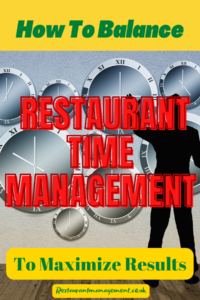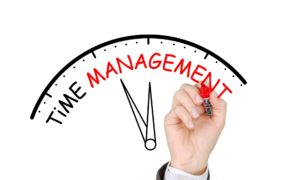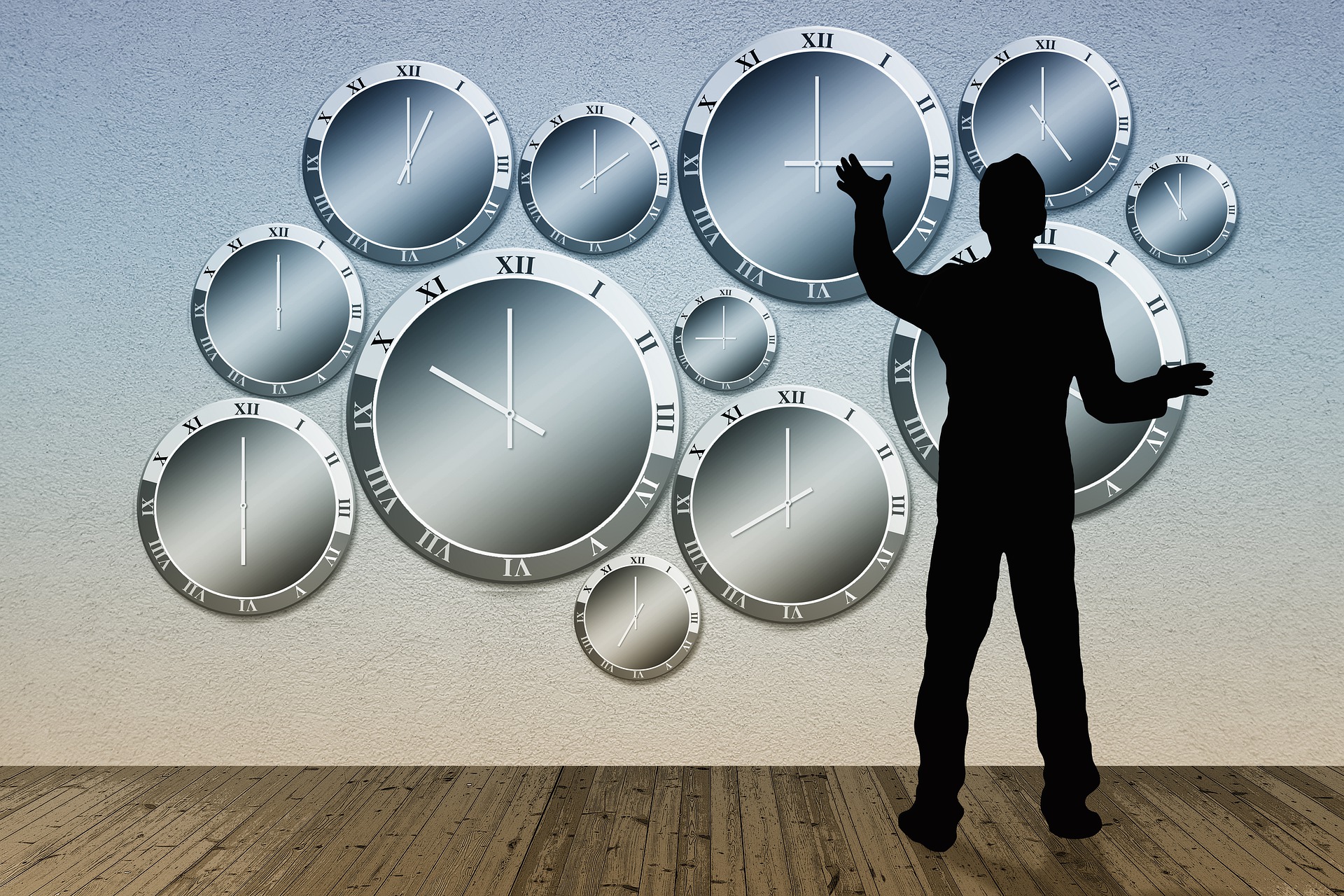Restaurant Time Management
Restaurant time management is an important part of running a successful restaurant, but in the fast-paced, high-pressure world of the food industry, it is often overlooked.
If a restaurant doesn’t use its time well, it can waste money, make customers unhappy, and wear out its staff.
Effective time management can help create a positive environment, increase productivity, and keep customers coming back for more.
This article will go into detail about how important restaurant time management is, give real-life examples and tips for success, and show how mastering restaurant time management can help a restaurant business do well.
When it comes to running a successful restaurant, there are a lot of things to keep track of, like making sure the kitchen is running smoothly and ordering ingredients.
At first glance, restaurant time management might not seem like a big deal in the busy world of restaurants. But time management is an often overlooked part of running a restaurant that can make or break a business.
After all, shouldn’t a restaurant be able to serve food quickly and well? But the truth is that bad restaurant time management can cause a lot of problems.
One of the hardest things about managing time in a restaurant is dealing with things that come out of the blue.
For example, an unexpected rush of customers can quickly throw off a kitchen’s schedule, causing long wait times and delays.
In the same way, a large party or catering event can put a strain on a restaurant’s resources, which can lead to delays and staff that is too busy to serve customers. But not only unplanned events can make things go wrong. Even the best-laid plans can fail if the staff isn’t properly trained or motivated.
That’s why it’s so important to talk to each other clearly and have a strong team.

So, how can restaurant owners and managers make sure they are good at managing time in their restaurants?
Here are some suggestions:
- Make a plan.
One of the best ways to avoid rushing around at the last minute is to plan as much as you can.
This means knowing how many people can fit in the restaurant and how many people are likely to come on any given day.
It also means keeping track of your stock and ordering ingredients ahead of time.
- Be flexible.
Even the best plans can go wrong, so it’s important to be able to deal with whatever comes your way.
This means that you should be willing to change the schedule as needed and be ready to hire more people if you need to.
- Talk to each other well.
The key to a successful team is clear communication, and this is especially true in the fast-paced world of restaurants.
Make sure everyone is on the same page, and take the time to hear feedback and suggestions.
- Look after your staff.
The restaurant business is known for being high-stress and high-pressure, which can cause employees to burn out.
It’s important to take care of your team by giving them the help they need and letting them take breaks and days off regularly.
In the end, managing time is an important part of running a successful restaurant.
Restaurant owners and managers can make sure their business runs smoothly and efficiently by making plans ahead of time, being flexible, communicating well, and taking care of their staff.
With the right approach, you can create a good atmosphere, increase productivity, and keep customers coming back for more.

How to Manage Time in the Restaurant Business
What approaches help time management?
Pareto Analysis, or the “80/20 rule,” is a method for figuring out which tasks are the most important and putting them in order of importance. You can make the best use of your time by focusing on the 20% of tasks that will bring 80% of the results.
- Blocking time means setting aside certain chunks of time for certain tasks and activities. This helps you stay focused and avoid distractions so you can get things done more quickly.
- To-do list: Make a list of things to do and put them in order of how important they are. This makes sure that nothing is forgotten and helps keep track of what needs to be done.
- Delegation: Giving tasks to other members of your team can be a great way to manage your time because it lets you focus on more important tasks and lets others learn and grow.
- Elimination of Distractions: Identifying and getting rid of distractions that take time and attention away from important tasks can help increase productivity and focus.
- Self-reflection: You can make better use of your time in the future if you think about how you spend your time and find ways to improve.
When used with Pareto Analysis, all of these techniques will help you manage your time better by making the most of your time and putting your attention on the most important tasks.

Real-Life Example: How A Local Pizza Restaurant Turned Things Around
Poor restaurant time management had become a big problem at this local pizza restaurant, which was in the middle of town.
The locals loved the restaurant, but it was hard for the staff to keep up with the lunch and dinner rush. Staff morale was low, wait times were long, and food was often cold by the time it got to the table.
The manager of the restaurant knew that something had to be done. He hired a consultant to help him look at how the restaurant worked and figure out what was wrong. The consultant quickly saw that the problem was caused by poor restaurant time management. The kitchen staff didn’t know how to manage their time well, and the front and back of the house didn’t talk to each other enough.
The restaurant manager made a few key changes to turn things around. First, he put money into training his kitchen staff and teaching them how to make and serve food quickly and well.
He also set up a new software system to keep track of food and beverage orders and encourage the front-of-house team to communicate more effectively with each other.
Finally, he came up with a new menu that was simpler and easier to make, which made the job of the kitchen staff easier.
The effects were shocking!
Wait times were cut in half, the food got better, and staff morale went through the roof. After making the changes, the restaurant’s sales went up by 18% in the first quarter and customer satisfaction went up by 15%.

Related articles:
How To Improve Restaurant Profits
Restaurant Management Structure
Strategies for Success
One way that good restaurant time management can lead to success in the restaurant business is shown by the turnaround of the Pizza restaurant.
But what can owners and managers of other restaurants do to get the same results?
Effective Communication And Building Teams In Running A Restaurant
Communicate well: Clear communication is the key to a successful team, and this is especially true in the fast-paced world of restaurants. Make sure everyone is on the same page, and take the time to hear feedback and suggestions.
Set up a way for the front and back of the house to talk to each other and keep track of orders, such as a digital ordering system or a kitchen display system.
For a restaurant to run smoothly, people must be able to talk to each other and work as a team. Some ways to build a strong team and help people talk to each other well are:
- Clearly defining roles and responsibilities: Making sure everyone knows what is expected of them can help reduce confusion and boost productivity.
- Encouraging open communication: Creating an environment where employees feel comfortable sharing ideas and concerns can help find problems early and improve operations as a whole. By giving regular training and feedback, you can help your employees improve their skills and feel more confident in their jobs.
- Building a positive culture: Making a work environment that is positive and supportive can help boost morale and bring the team closer together.
- Recognizing and rewarding good work: Recognizing and rewarding staff for their hard work and contributions can help motivate and keep top performers.
- Encourage teamwork: Get your employees to work together and work as a team. This will help build trust and create a good working relationship.
- Making a schedule that works for everyone: Making a schedule that takes the needs of employees into account can help cut down on staff turnover and improve operations as a whole.
- Managing conflicts: When a conflict arises, talk about it directly and fairly. This will help keep it from getting worse and keep the workplace healthy.
Overall, the best way to build a strong, efficient, and productive team in a restaurant is through good communication and team building.

Improving How Restaurants Keep Track Of Time By Using Technology
Technology is a powerful tool that can help people in the restaurant business better manage their time. Think about using a point-of-sale system that works with kitchen display systems, software for managing inventory, and software for making schedules.
By automating things like keeping track of orders and managing stock, technology can help speed up operations and reduce the chance of mistakes.
Technology can be a great way for a restaurant to better use its time. Some of the ways that technology can help you manage your time better are:
- Routine tasks can be automated. Routine tasks like managing inventory and making schedules can be automated to save time and cut down on mistakes.
- Streamlining communication: Tools like messaging apps, email, and video conferencing can make it easier for staff and management to talk to each other.
- Improving customer service: Using technology like online ordering and mobile payment systems can improve customer service by reducing wait times and making things run more smoothly.
- Tracking performance: Tools like data analytics and reporting can help managers keep track of performance and find places where it could be better.
- Taking care of reservations: Online reservation systems make it easier to book tables and keep track of customer information.
- Software for managing the kitchen: Software for managing the kitchen can help the kitchen staff work together better and serve customers faster.
Point-of-Sale (POS) systems can help speed up the process of taking orders and processing payments. They can also give you valuable information about sales, inventory, and how customers act.
Overall, technology can help a restaurant better manage its time by streamlining processes and making them run more efficiently.

Tracking And Analysing Performance To Improve Restaurant Time Management
Monitor Performance: Check on performance on a regular basis, keep track of customer feedback and satisfaction, and analyse data to find places to improve.
Using different methods, such as:
- Tracking time: Keep track of how much time is spent on different tasks and activities throughout the day.
- Setting priorities: Put tasks in order of importance and urgency.
- Setting goals: Set time management goals that are clear, specific, and measurable.
- Self-reflection: Think about how you spend your time and look for ways to improve.
- Feedback: Ask other people what they think about your time management skills.
- Technology: Use tools like calendars, timers, and apps that help you get things done to better manage your time.
- Continuous improvement: Look at your restaurant’s time management strategies often and make changes to make them more effective and productive over time.
Use this information to make changes and get better at managing your time. In the end, managing time is an important part of running a successful restaurant.
Time Management Approaches For Effective Restaurant Meal Preparation
Plan Ahead: One of the best ways to avoid rushing around at the last minute is to plan as much as you can in advance. This means knowing how many people can fit in the restaurant and how many people are likely to come on any given day. It also means keeping track of your stock and ordering ingredients ahead of time.
Help make cooking easier by making sure everything is in its place and easy to find.
- Using a prep list: Make a list of tasks that need to be done before service and give them to different kitchen staff members. This can help make sure everything is ready on time and reduce the chance of rushing around at the last minute.
- Preparing ingredients ahead of time: Prepare ingredients like meats and vegetables ahead of time to cut down on the time it takes to make meals during service. Before you start cooking, make sure you have all the ingredients and tools you need. This can make cooking faster and easier by making sure everything is in its place and easy to find. Batch cooking is a way to save a lot of time and energy by cooking a lot of food at once and storing it for later use.
- Using a timer: Use a timer to keep track of cooking times and make sure dishes are ready to be served at the right time.
- Putting tasks in order of importance: Do the most important tasks first and put the rest in order of how long they take.
- Plate presentation: Make sure that all of the dishes look good and taste good, with a balance of colours, textures, and flavours.
- Communication: Talk to the servers and the rest of the kitchen staff often so that everyone knows what needs to be done and when. This can help clear up any confusion and make sure the service goes well.
- Practice and rehearse: The dishes are run through a run-through before the service so that the timing, presentation, and taste can be checked. Also, practise makes perfect, so the more you cook a dish, the better you’ll get at it.
- Delegation: Giving tasks and responsibilities to different team members can help make sure everything gets done on time and lighten the load on any one person.
Setting Up A Kitchen Display System
A kitchen display system (KDS) is a digital system that lets the kitchen staff keep track of orders, talk to servers and other staff, and manage inventory in real time.
Using a KDS can make a restaurant kitchen much more efficient and help people talk to each other better.
Here are some things to think about when putting in place a KDS:
- Check out your options:
Check out the different KDS systems on the market to find one that fits your restaurant’s needs.
Think about things like cost, how easy it is to use, and how well it works with the software you already have.
Once a KDS is chosen, all kitchen staff should be shown how to use it.
This includes showing them how to enter orders, track their progress, and talk to other staff members.
- Organize the system:
Install the KDS and link it to the software your restaurant already has, like point-of-sale and inventory management systems.
- Check how it works:
Check the KDS to make sure it works right and that everyone on staff knows how to use it.
Implement and watch: Once the KDS is up and running, keep an eye on how it’s doing and make any changes that are needed.
Talk to your staff often and get their feedback to make sure the system is meeting their needs and helping them do their jobs better.
- Maintenance:
If you keep up with the system’s maintenance, it will run smoothly and not break down.
Add it to the way things work in your restaurant. Add the KDS to the way things work in your restaurant and make sure your staff uses it consistently.
This will help make sure that it is used to its fullest potential and that communication and efficiency are improved.

How To Manage Time And Train and Motivate Restaurant Staff.
Be flexible: Even the best-laid plans can go wrong, so it’s important to be able to roll with the punches This means that you should be willing to change the schedule as needed and be ready to hire more people if you need to.
Train and encourage your staff: The restaurant business is known for being high-stress and high-pressure, which can make your employees feel burned out. It’s important to take care of your team by giving them the help they need and letting them take breaks and days off regularly.
Invest in training for your staff, such as teaching them how to manage their time, and be clear about what you expect from them.
Restaurant time management in a restaurant depends on how well the staff is trained and how motivated they are.
Staff that are well-trained and motivated can speed up and improve the quality of service, which can make customers happier and bring in more money.
Here are a few reasons why staff training and motivation are important for restaurant time management in a restaurant:
1. Staff who are well-trained in their jobs and know how the restaurant works will be able to work faster and better, which will cut down on the time it takes to prepare and serve meals.
2. Better communication: Trained and inspired employees are more likely to be able to talk to each other well, which can help cut down on confusion and mistakes in the kitchen.
3. Productivity goes up: Employees who are motivated will work harder and be willing to take on more responsibilities, which can help lighten the load of other employees.
4. Reduced turnover: When employees are properly trained and motivated, they are less likely to quit. This saves money and time because you don’t have to keep hiring and training new people.
5. Better customer service: When employees are trained in customer service and want to give customers a good experience, they are more likely to give great service, which can make customers happier and bring them back.
6. Flexibility: Trained staff can do more than one thing in the kitchen, which can help cut down on the need for extra workers during busy times.
Staff training programmes that work well should include hands-on training, ongoing education, and regular evaluations of how well the staff is doing.
Staff will stay motivated and interested if they get rewards and praise for their work on a regular basis.
Overall, investing in staff training and motivation can have a significant impact on time management in a restaurant and lead to increased success.
What Are The Five Most Important Parts Of Being Good With Time?
- Prioritisation is the ability to figure out what tasks and goals are most important and to focus on them, as well as to use time well to get them done.
- Planning is the process of setting goals, making plans for how to reach them, and making a schedule.
- Organization means being able to keep track of tasks, deadlines, and resources and keeping them all in order.
- Delegation: The process of assigning tasks to others and entrusting them with the responsibility to complete them.
- Flexibility is the ability to deal with changes, unexpected events, and shifting priorities and to make changes to plans and strategies as needed.
Conclusion
In the end, managing time in a restaurant is an important part of running a successful food business.
Restaurant owners and managers can make sure their business runs smoothly and efficiently by planning ahead, being flexible, and communicating well. Training and motivating their staff, using technology, and keeping an eye on how well your employees are doing is a great way to go.
With the right approach, you can create a good atmosphere, increase productivity, and keep customers coming back for more.
Introducing the Unlocking The Secrets Of Time Mastery

Are you tired of watching unproductive and unfulfilled hours slip through your fingers? Do you long to achieve more in less time? If so, you’re about to embark on a journey to revolutionise your approach to time.
Introducing the Unlocking The Secrets Of Time Mastery: How To Use Time Management To Skyrocket Your Productivity.
Remember, time is your most precious resource. Invest in Unlocking The Secrets Of Time Mastery: How To Use Time Management To Skyrocket Your Productivity, and watch your productivity soar while achieving the work-life balance you deserve. Don’t wait; your time is now!
🔑 Take Action Now: Click the “Order Now” button below to unlock time mastery secrets. Don’t let another minute slip away; take charge of your life today!


